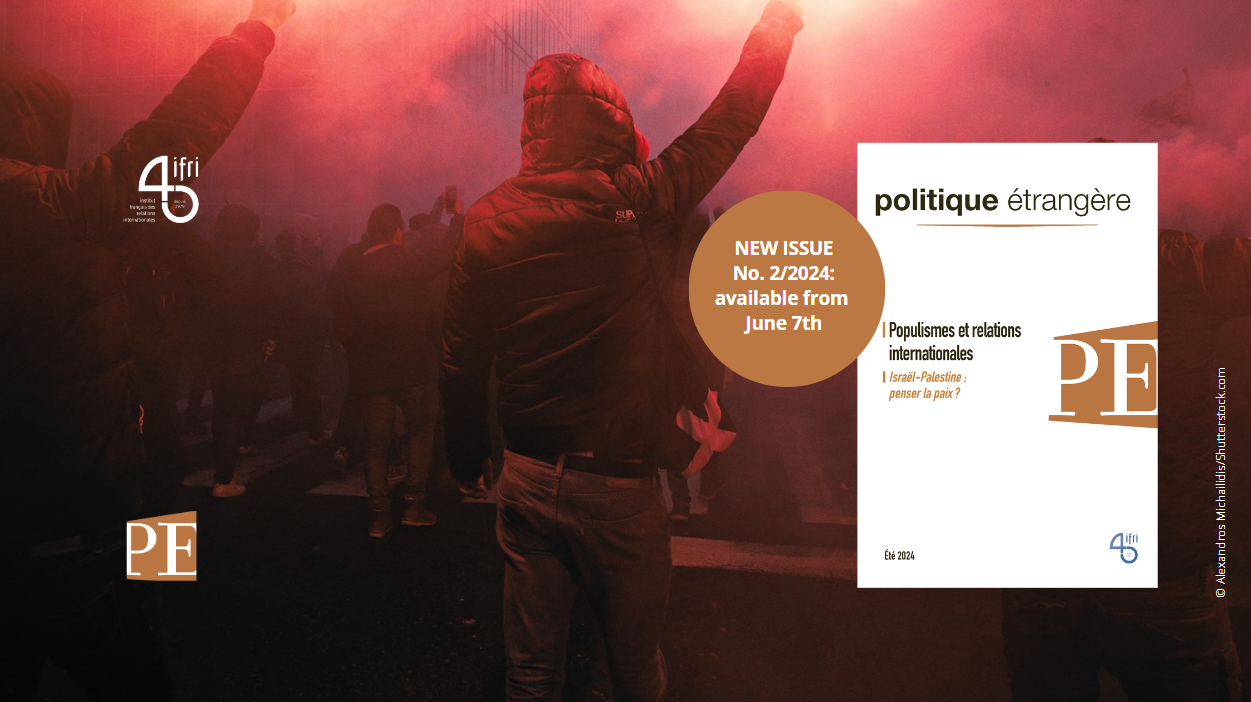Populism and International Relations
Populism is flourishing, in Europe and elsewhere: a populist holds power today in Argentina and perhaps tomorrow in the United States. What does its spread say about our societies? And how is it shaping them, where populists rule? Do their economic policies stand any chance of success? Do their foreign policies have a greater impact on the world around them or at home? If “Trump 2.0” comes to be, will he have a free hand? If so, what can we expect?

Does the tragedy in Gaza leave any room for hope? Can the two-state solution, the only rational one, still be implemented? The challenges are daunting: redrawing a geography fractured by colonization; establishing a credible Palestinian voice that can engage in a long negotiation; seeking acceptance in Israeli society; and rallying a range of foreign powers to take concrete action and push for the only remaining solution.
Beyond Ukraine and Gaza, Africa has been serving as a playing field for rival powers of all stripes: while France retreats and the US hesitates, Russia is advancing and several other states are making their presence felt—Turkey, Iran, the Gulf states, Hungary, even Ukraine. The range of opportunist strategies keeps growing, but is there a common geopolitical rationale underlying them all?
In the interview that opens this issue of Politique étrangère, Thierry de Montbrial analyzes an international scene in which the major instruments conceived in recent decades to foster global governance have been undermined. In particular, he considers the effects of the war in Ukraine and the uncertain destiny of the European Union.
This issue is available in French only: Populismes et relations internationales
Global Governance, Ukraine, and the European Union: Quo Vadis?, by Thierry de Montbrial
POPULISM AND INTERNATIONAL RELATIONS
Populism and the Far Right: What Exactly Do We Mean?, by Jean-Yves Camus
The Diversity and Failures of Economic Populism, by André Cartapanis
What Is a Populist Foreign Policy?, by Sandra Destradi
US Institutions and the “Trump 2” Hypothesis: The Lure of Authoritarianism, by Lauric Henneton
Argentina in the Era of “Mileism”, by Florian Vidal
ISRAEL-PALESTINE: THINKING ABOUT PEACE?
Israel-Palestine: One Solution, Two States, by Élie Barnavi
Israel-Palestine: The Question of Geography, by Michel Foucher
CURRENT AFFAIRS
The Red Sea: A New Geopolitical Era, by Cyrille P. Coutansais
Africa: The New Great Game, by Thierry Vircoulon
Myanmar: Military Victory Unattainable, Negotiated Peace Unlikely?, by Christian Lechervy
BAROMETERS
Paris 2024: The Geopolitics of the Olympic Games, by Jean-Baptiste Guégan
Syria: “Post–Civil War” Reprisals and the Persistence of the Past, by Myriam Benraad
BOOK REVIEWS
Editor: Marc Hecker
L’enchevêtrement des crises au Sahel. Niger, Mali, Burkina Faso, Jean-Pierre Olivier de Sardan
Le djihad de la vache. Pastoralisme et formation de l’État au Mali, Giovanni Zanoletti
Read by Alain Antil
Backfire. How Sanctions Reshape the World Against U.S. Interests, Agathe Demarais
Read by Michel Makinsky
Download the full analysis
This page contains only a summary of our work. If you would like to have access to all the information from our research on the subject, you can download the full version in PDF format.
Populism and International Relations
Related centers and programs
Discover our other research centers and programsFind out more
Discover all our analyses"Iron Swords" A Military Analysis of Israel's War in Gaza
On October 7, 2023, Hamas' attack, dubbed “Al-Aqsa Flood,” caused a major shock and led Israel to launch the longest war in its history. Operation “Iron Swords” was notable for its unprecedented intensity, both in terms of the massive ground forces deployed and the firepower used.
Saudi Arabia’s Nuclear Temptations. Lessons Learned from Regional Instability
Saudi Arabia’s integration in the international arena and regional stability, notably through reducing its dependence on fossil energies, are crucial elements for the success of the Kingdom’s Vision 2030, the Crown Prince’s top priority. However, Mohammed bin Salman’s declarations in 2018 and 2021, indicating that “if Iran develops a nuclear bomb, we will follow suit as soon as possible”, combined with the recent strikes on key Iranian nuclear facilities, do not bode well for the future of the Kingdom, the region and the non-proliferation regime at large.
The Future of Air Superiority. Command of the Air in High Intensity Warfare
Air superiority, understood as control of the air, is a cornerstone of the Western art of warfare. It is a decisive condition, albeit not sufficient by itself, to achieve military victory, as it enables the concentration of air power toward the achievement of wider strategic objectives and protects other components from unbearable attrition levels. It is best achieved through the offensive use of air power in a joint effort to neutralize the enemy’s air power.
Europe Uncovered?
As Russia continues to threaten Europe, the Trump administration is making no secret of its desire to withdraw—at least partially—from the defense of the Old
Continent in order to focus on strategic competition with China. It is thus putting pressure on its European allies to increase their investment in the military sector. The NATO Summit in The Hague in June 2025 resulted in ambitious commitments by member states to increase their defense spending.










